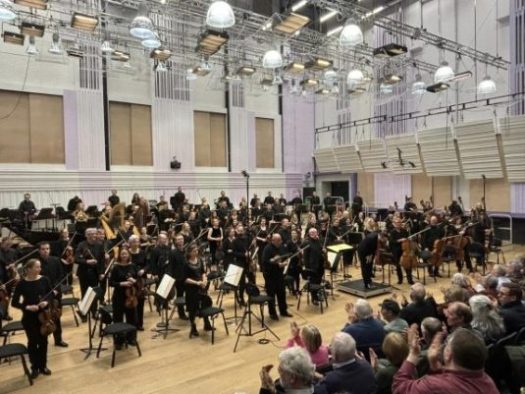 United Kingdom MacDowell, Bax: Peter Dixon (cello), BBC Philharmonic / John Wilson (conductor). BBC Philharmonic Studio, MediaCityUK, Salford, 22.2.2024. (RBa)
United Kingdom MacDowell, Bax: Peter Dixon (cello), BBC Philharmonic / John Wilson (conductor). BBC Philharmonic Studio, MediaCityUK, Salford, 22.2.2024. (RBa)

Edward MacDowell – Hamlet and Ophelia; Romance; To a Wild Rose; Suite No.1
Arnold Bax – Spring Fire
Light music is one of conductor John Wilson’s specialities. His work on scores for films and shows helped jump-start his career. That strand continues in masterful glamour alongside later connections, which have taken the form of orchestral forays including Ravel’s music and the symphonies of Rachmaninov and Korngold. To my ears, and heart, not everything in these later attempts has been an utter success. Vitality and sheer poetic excitement have been blunted and softened. That said, Wilson did very good work in commercial recordings of Dutilleux and Bax, among others.
The new Director of the BBC Philharmonic, Adam Szabo, introduced this Salford concert. There also were Wilson’s typically relaxed and helpfully friendly brief intros, especially useful for MacDowell’s Suite and Bax’s Spring Fire.
Edward MacDowell’s works illustrate light tendencies from the late nineteenth century. The orchestra and conductor returned today to a composer whom they honoured with a super-rare all-MacDowell concert on 19 September 2023, also in Salford. Rather like two of the works, Lamia and Lancelot and Elaine, which they played then, this aspect of MacDowell’s oeuvre is not ‘light’ in any Coates or Ketèlbey sense. Hamlet and Ophelia is firmly and stormily late-romantic.
On the other hand, we heard superior examples of ‘seaside resort orchestra’ repertoire: the sheerly lovely Romance and the equally short To a Wild Rose, one of MacDowell’s ‘hits’ heard here in orchestral garb, as well as the five movements of the Suite No.1 (In a Haunted Forest; Summer-Idyll; In October; The Shepherdess’ Song; Forest Spirits). Reminiscent of Grieg, they are slightly wan, superbly orchestrated and limpidly beautiful in the style of Last Spring and the Holberg Suite. The performances in Salford were to match and included the very affecting little Romance for cello and orchestra, which has parallels with short works by Dvořák and Bridge.
Hamlet and Ophelia falls into two sections – character sketches – separated by a momentary pause. The Hamlet section is Tchaikovskian, replete with melodramatic thunder and lightning. The Ophelia segment is memorable for its soft horn calls. If you have a taste for the more dramatic and profound MacDowell, do try the rather elderly but virile 1960s Bridge recordings by the Royal Philharmonic Orchestra conducted by Karl Krueger. The suite, which I do not recall hearing before whether as a recording or live, ended with a gloriously executed, breathtakingly feathery pianissimo étincellante ‘explosion’.
The Swinburne-inspired Bax came after a short intermission, and the BBC PO was expanded to extravagant proportions. Spring Fire, a sort of Bax ‘Symphony No.0’, predates the First Symphony. (The First can be heard in Northampton on 2 March 2024 with conductor John Gibbons.) Spring Fire, a symphony running to about thirty minutes, is in five movements played without a break. The orchestra for MacDowell’s pieces ran to about seventy but the Bax work amply filled the podium (80-85 players) with celesta, piano, two harps, three percussion (or was it four), seven horns, three each trombones and trumpets, plus tuba and eight double basses; strings and winds (including contrabassoon and bass clarinet) were in proportion.
The work, which Bax wrote at the end of his twenties, is gorgeous, as you might expect from its utterly beguiling dewy and jaw-droppingly beauteous ‘prelude’ all the way to its exultant horn-fanfaring finale. It sweeps all before it. The piece is bejewelled and deeply indulgent. Audiences should hear it more often. Often luxuriously dense work is offset by seeing the orchestra play, and this helps clarify and deepen enjoyment. Would I otherwise have noticed two short and tenderly touched-in solos by orchestral leader, Yuri Torchinsky?
Spring Fire may lack the light-filled straight talking driven drama and super-clear enchantment of the later symphonies, but it has many strengths. This is Bax imbued with the spirit of Pan, of cooling glades and zephyrs and baking summer – all despite the work’s title. The same Bax can be heard in The Happy Forest and Nympholept. The style finds echoes, pre-echoes and coincidences in the orchestral works of Joseph Marx and Granville Bantock. The latter wrote an exotic Atalanta in Calydon, a symphony for voices and colour-keyboard effects à la Scriabin; it was also inspired by A.C. Swinburne’s poem of the same title.
For all its densely entangled orchestral tissues, Spring Fire should be heard more often. I first encountered it live at the 1996 BBC Proms, when the BBC SO were conducted by Mark Elder; he later recorded it with the Halle. And let us not forget Vernon Handley’s recording for Chandos.
In the next months, we can perhaps expect BBC Radio 3 broadcasts of this concert, both the MacDowell and the Bax.
Rob Barnett
